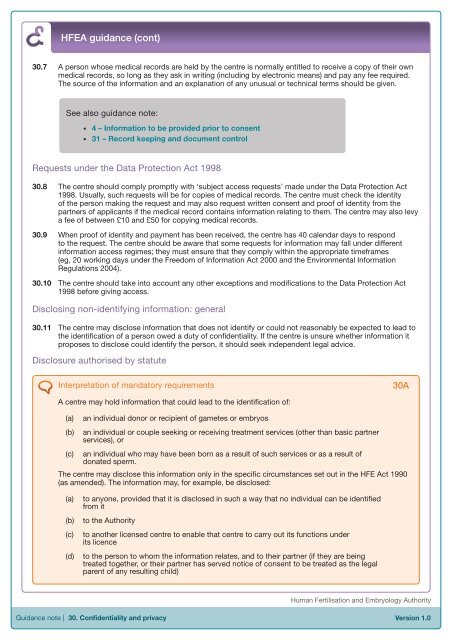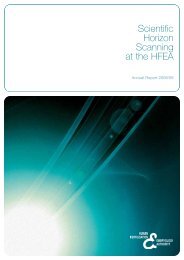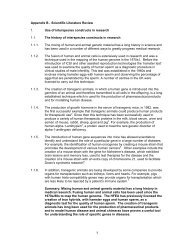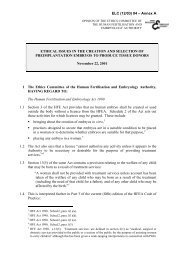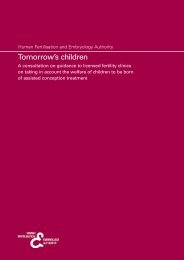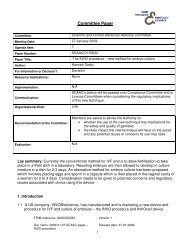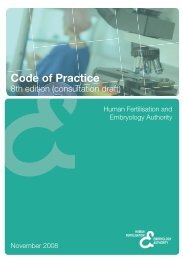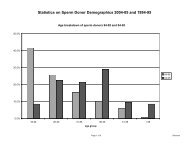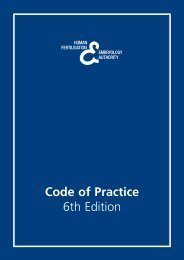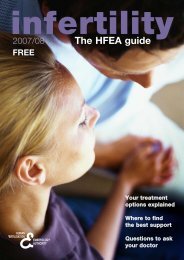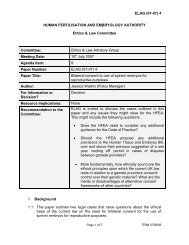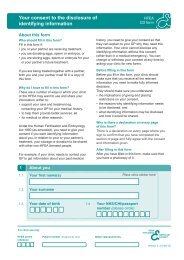Eighth Edition - R.3 - Human Fertilisation & Embryology Authority
Eighth Edition - R.3 - Human Fertilisation & Embryology Authority
Eighth Edition - R.3 - Human Fertilisation & Embryology Authority
Create successful ePaper yourself
Turn your PDF publications into a flip-book with our unique Google optimized e-Paper software.
HFEA guidance (cont)<br />
30.7 A person whose medical records are held by the centre is normally entitled to receive a copy of their own<br />
medical records, so long as they ask in writing (including by electronic means) and pay any fee required.<br />
The source of the information and an explanation of any unusual or technical terms should be given.<br />
See also guidance note:<br />
<br />
<br />
4 – Information to be provided prior to consent<br />
31 – Record keeping and document control<br />
Requests under the Data Protection Act 1998<br />
30.8 The centre should comply promptly with ‘subject access requests’ made under the Data Protection Act<br />
1998. Usually, such requests will be for copies of medical records. The centre must check the identity<br />
of the person making the request and may also request written consent and proof of identity from the<br />
partners of applicants if the medical record contains information relating to them. The centre may also levy<br />
a fee of between £10 and £50 for copying medical records.<br />
30.9 When proof of identity and payment has been received, the centre has 40 calendar days to respond<br />
to the request. The centre should be aware that some requests for information may fall under different<br />
information access regimes; they must ensure that they comply within the appropriate timeframes<br />
(eg, 20 working days under the Freedom of Information Act 2000 and the Environmental Information<br />
Regulations 2004).<br />
30.10 The centre should take into account any other exceptions and modifications to the Data Protection Act<br />
1998 before giving access.<br />
Disclosing non-identifying information: general<br />
30.11 The centre may disclose information that does not identify or could not reasonably be expected to lead to<br />
the identification of a person owed a duty of confidentiality. If the centre is unsure whether information it<br />
proposes to disclose could identify the person, it should seek independent legal advice.<br />
Disclosure authorised by statute<br />
Interpretation of mandatory requirements<br />
30A<br />
A centre may hold information that could lead to the identification of:<br />
(a)<br />
an individual donor or recipient of gametes or embryos<br />
(b) an individual or couple seeking or receiving treatment services (other than basic partner<br />
services), or<br />
(c) an individual who may have been born as a result of such services or as a result of<br />
donated sperm.<br />
The centre may disclose this information only in the specific circumstances set out in the HFE Act 1990<br />
(as amended). The information may, for example, be disclosed:<br />
(a)<br />
(b)<br />
(c)<br />
(d)<br />
to anyone, provided that it is disclosed in such a way that no individual can be identified<br />
from it<br />
to the <strong>Authority</strong><br />
to another licensed centre to enable that centre to carry out its functions under<br />
its licence<br />
to the person to whom the information relates, and to their partner (if they are being<br />
treated together, or their partner has served notice of consent to be treated as the legal<br />
parent of any resulting child)<br />
<strong>Human</strong> <strong>Fertilisation</strong> and <strong>Embryology</strong> <strong>Authority</strong><br />
Guidance note | 30. Confidentiality and privacy<br />
Version 1.0


